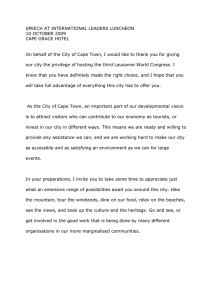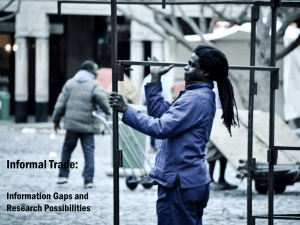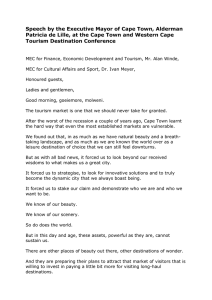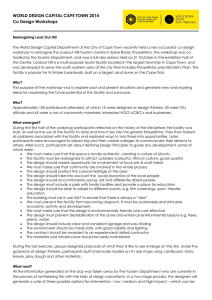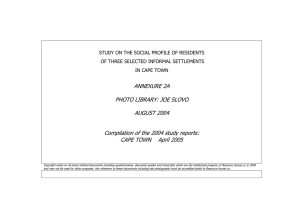Cape Town: Ready to host the 2010 FIFA World Cup™ 2010 Operational Readiness:
advertisement
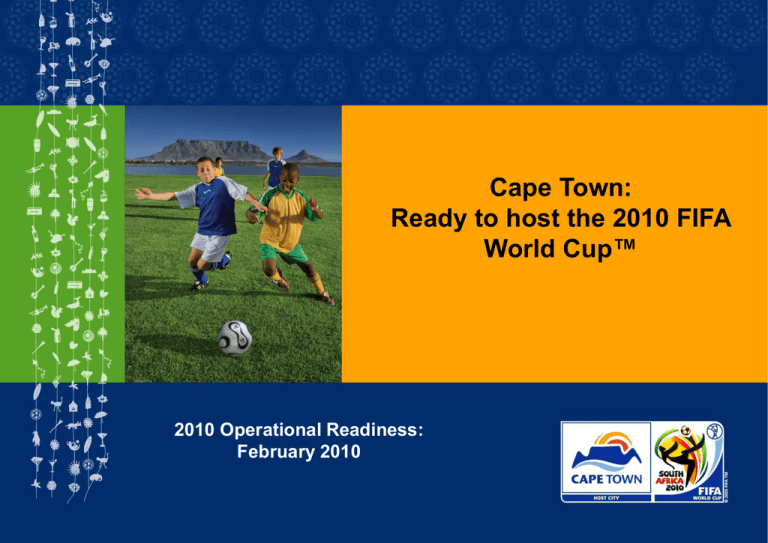
Cape Town: Ready to host the 2010 FIFA World Cup™ 2010 Operational Readiness: February 2010 ECONOMIC DEVELOPMENT: HOST CITY: CAPE TOWN POSITIONING City of Cape Town 5 Year Plan (IDP) “While Infrastructure led growth is a major development theme over the period, it is equally important that location branding and marketing remain an important objective: investors and visitors need to be kept interested.” Host City 2010 Objectives Maximum public benefit and lasting legacy: Infrastructure Economic Opportunities Environment Desirable destination for investors and tourists Leveraging long-term economic growth 2010 FWC: A CATALYST FOR ECONOMIC DEVELOPMENT • 2010 Economic Development Programme is a feature of the broader Economic Development Strategy of the City • Event used as a catalyst to strategically market/position Cape Town as a desirable destination for: – Trade – Investment – Leisure – Events – Conferences, etc • Implementation of ethical business practices increases our attractiveness tor further trade and investment hereby contributing to the longer term sustainability of our economy • 2010 is a leverage point for increased human capital development in the SMME and Informal sector (Intensification of the existing business support services) • Current Infrastructure investments are critical enablers for local economic development activities: increases mobility/ access, etc • Commitment to SMME involvement in the event: 30-40 % of city spend allocated to SMME’s Economic Development 2010 Business Information Outreach Sessions •Business Information sessions: increasing business readiness ; prevention of infringements •Chambers of Commerce, Business Place; Community Business Fora, Small Business Week, etc) •Training of LED practitioners re 2010 readiness •Central City Partners Forum through Cape Town Partnership Research •2010 Business Readiness Survey and the 2010 Investment Marketing Strategy (recommendations incorporated into the city’s ED Strategy) •Socio Economic Impact assessment to be conducted during and post 2010 Trader/Vendor Development Project •Training of SMME’s and vendors that will be selected to trade in 2010 spaces: basic business, ambassadorial, PR skills; Food Handling, etc Trade and Investment Marketing: Sector Bodies Wesgro: •Intensifying the profiling and marketing of the trade and investment capabilities of the region (promotional collateral) •Intensification of business support training programme e.g. procurement processes •Inclusion of 2010 readiness messages into all in-coming and out-going business missions and other trade platforms e.g. AfricaCom; World Economic Forum •Inclusion of trade and investment messages into relevant 2010 platforms e.g. Economic Development Trade and Investment Marketing: Sector Bodies Cape Film Commission: •Hosting of 5 day digital boot-camps: provision of production, camera or sound recording assistance •Training : film liaison, scriptwriting and use of high definition broadcasting equipment •Provision of syndicated content to FIFA TV and other networks •Familiarisation tours for various in-bound broadcast delegations - studio & site inspections: to market CT’s readiness and CT as a film destination of choice •Provision of strategic and logistical support to Cape Media Services: provision of content and delivery of media support/logistical services Cape Craft and Design Institute (CCDI) •Design, innovation and advisory services to crafters during product development stages •Scouting and negotiation re market access and opportunities for crafters •Workshops with crafters on FIFA regulations •Sourcing of local handcrafted products to showcase at 2010 spaces (VIP Hospitality areas) •Professional advice in the selection of products /crafters for vending opportunities Cape Information & Technology Initiative (CITI) • 2010 Readiness messaging at various platforms e.g. “Third Global Forum on Business Incubation” in Brazil INFORMAL TRADING AND VENDING Components Activities/Tasks As-is Audit of •Audit to determine impact of 2010 footprint on existing traders sites and products •Strategy to minimise negative impact on affected traders Legislative context •Review of the current legislative arrangements governing informal trading on the 2010 footprint Trading/Vending opportunities •Identification of Informal Trading /Vending Opportunities in and around 2 010 sites •Identification of appropriate alternate sites in terms of the relevant legislative frameworks to accommodate affected traders •Demarcation of 2010 and alternate trading sites conducted as per legislative requirements •Arrange Infrastructural requirements within 2010 sites and alternate sites •Relocation of affected traders as per Council resolutions Communication and Stakeholder Engagement •Generic Communication to the Informal Trading Sector •Traders directly affected by the 2010 footprint •Traders surrounding the 2010 event sites(indirect impact) INFORMAL TRADING AND VENDING Components Activities/Tasks •Responsible Informal Trading Programme •Business Support Services to enhance skills and business practices •2010 Rights Protection Programme •Quality Management Informal Trader Deployment & Management Project •Advertisement of opportunities •Selection of vendors according to set criteria •Deployment and on site management of vendors FIFA negotiations •Commercial Restriction Zones •Non competitive, unbranded Food and Beverage range •African Handcraft Product List Legacy •Initiate processes to identify new markets and trading opportunities across the city Informal Trading/Vending: Some Considerations • Finality on the Commercial Restriction Zones with FIFA and LOC • Traders impacted by footprint (finding win-win outcomes) • Agreement with FIFA on what may be deemed appropriate con-competitive Trading Opportunities and Products within restricted sites • Weather, Spectator numbers and profile of visitors • Product: Demand and Supply requirements • Perception that current City Informal Trading Bylaws and procedures are suspended throughout the city during 2010 • Enforcement of the current business related legislation and RPP: eg Counterfeit Goods Act, Merchandise Marks Act, Intellectual Property Right Acts • Balancing street vending activities with Safety and Security Requirements • All opportunities will be advertised in the public domain, ensuring fairness 2010 Tourism Strategy •To attract as many tourists as possible •To increase spending •To extend the visitor stay •To ensure repeat visits •To establish destination desire FOR HOST CITY CAPE TOWN FIFA WORLD CUP SOUTH AFRICA 2010 2010 Tourism Destination Profiling •Platforms to profile City’s tourism and leisure capabilities as well as 2010 readiness: World Travel Market; Soccerex (London); IFTM Top Resa (Paris); Destination Expo (Cape Town); Vakantiebeurs ( Holland); ITB; Germany; Berlin; Indaba •International Destination Marketing Campaigns: Key Source Markets ( UK, Germany, US, Netherlands) •Domestic Marketing Campaigns (KZN, JHB PE, Sawubona, etc) •Tourism Marketing Toolkit •Official Guide (Final Draw and 2010 Versions) Destination Activation •Live It! Love It! LOUDER! Campaign; VIC activations; Industry Activations (Member sessions)Community Activations; Welcome Campaign E- marketing and communication •Website development (viral campaign) •Call Centre activation •PR and Media Campaigns •International Media Management 2010 Tourism Accommodation Programme •Verification of Accommodation stock incl. temporary stock •FIFA Accommodation programme •Non FIFA Accommodation •Accreditation & Service Excellence Visitor Services •VIC’s (including mobile and unmanned options) •Tourism safety Programme with SAPS •Cultural Tourism with Arts and Culture •Legible City with Transport •Guest Relations: (media, special travel groups, etc) •Industry Readiness Sessions Responsible Tourism •Code of Responsible Tourism •Tourism awareness and training 2010 Arts and Culture Objectives •Showcase talent, culture, history, gastronomy of Cape Town •Tool to Intensify Destination Profiling /marketing strategy •Creation of Income generating opportunities •Shared platforms with emerging and professional artists (skills transference and mentoring) Projects •Performing arts •Craft •Skills Training • Visual Arts •Cuisine Key Activities •40% of all performing arts requirements to be sourced from the local emerging sector •VANSA, PANSA and CCDI will provide specialist services •Programme to be officially launched in March (watch this space) •Public auditioning processes to commence soon 2010 Health Objectives • Implementation and monitoring of environmental health standards at 2010 event sites and in general • Increased preventative and health promotion strategies Initiatives • Environmental Health: Monitoring of Water and Air Quality, Noise levels • Food Safety: Industry Readiness sessions; monitoring of food quality • Health Promotion: Public and Personal Health messaging e.g. sensible drinking; safe sex 2010 Social Development Objective • To minimise the potential negative impacts that hosting the 2010 World Cup may have on already vulnerable groups Projects • 2010 Child Safety Plan • 2010 Street People Project • 2010 Substance Abuse Prevention Project Progress • Joint City and Provincial plans have been developed • Programme officially launches in March to coincide with Human Rights Day planning • Ongoing engagement between SAPS and SD towards the finalisation of the Commercial Sex Work and Human Trafficking matters 2010 Sport Development Objective • To use 2010 as a catalyst for the implementation of sustainable sport development programmes targeting youth and women Progress • Joint 2010 and Sport/Recreation initiative • Community sport and recreation leadership academy commenced: Partnership with Academic institutions (CHEC) • Community recreation and volunteer centres to become key focal points for child centred activities during the world cup THANK YOU DANKIE ENKOSI
